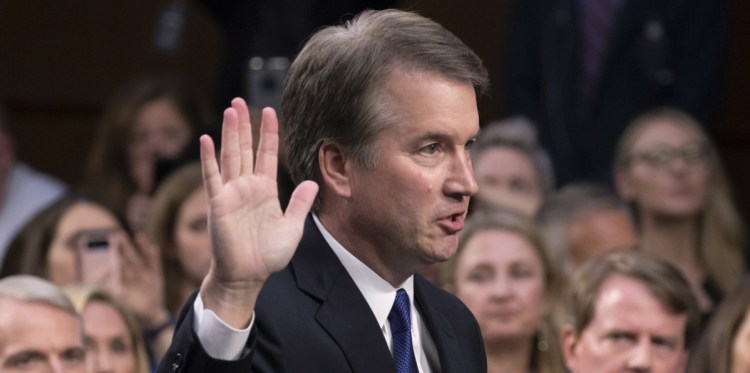After watching Judge Brett Kavanaugh deftly maneuver around the truth for three days during his last appearance before the Senate Judiciary Committee, it will be hard to believe anything he says if he winds up back there next week, fighting for his professional life.
Before that happens, the judge should do himself and his country a favor and withdraw his nomination for U.S. Supreme Court.
If that sounds unfair, blame Republican leadership in the U.S. Senate. Long before Christine Basey Ford came forward to report that she had been sexually assaulted by Kavanaugh when they were both teenagers, Republicans designed a politicized confirmation process in which the judge tried to hide his agenda.
The prize was a five-justice, right-wing majority that could scale back abortion rights, knock down gun control laws and whittle away environmental regulations. All they needed was a like-minded nominee to pretend he didn’t have an agenda. Using Kavanaugh in that role has damaged his credibility beyond repair.
Kavanaugh claimed that he was an impartial arbitrator, someone who hates judicial activism and loves the Constitution.
He looked sincere when he said it, but nobody really believed he was telling the whole story. President Trump, who promised to appoint only anti-abortion rights judges, certainly didn’t believe him. And neither did the right-wing activists at the Federalist Society who have groomed Kavanaugh since his student days, putting his name on a list for Trump of judges who could be trusted to pursue their agenda. The far-right Judicial Crisis Network did not spend more than $5 million in dark money to confirm an unknown quantity. But Kavanaugh avoided saying what might have given his supporters so much confidence in him.
Kavanaugh’s friends didn’t help him by rushing his nomination through the committee process without releasing the vast majority of records relating to his work as a staff member in the George W. Bush administration. Since they changed the Senate rules last year to require only a majority vote to confirm a Supreme Court justice, Kavanaugh could evade the tough questions, knowing that if the Republicans stuck together, he would get his promotion. Democrats didn’t like it, but they didn’t have the votes to do anything about it.
But now Kavanaugh is sunk if he loses just two Republican votes. For his nomination to survive, he will have to testify before the Judiciary Committee and convince people watching that unlike his last visit, he’s telling the whole truth this time.
The big event is next Monday, when Kavanaugh and Ford are both supposed to testify. It’s a bizarre re-creation of the 1991 Clarence Thomas-Anita Hill hearings, a catastrophic process that did permanent damage to the judicial system’s credibility. It’s an event no one should want to relive.
As with the Thomas hearings, there will be no formal charges, no investigation, no corroborating evidence, no jury and no verdict.
If Kavanaugh does not withdraw his nomination first, the long-term ideological orientation of the U.S. Supreme Court will be decided by the public’s immediate reaction to two witnesses testifying about what did or did not happen at a suburban house party in the 1980s. With a finger in the wind, Senate Republicans will assess whether they have the political muscle they need to force Kavanaugh onto the court.
It’s a terrible way to fill such an important job, but this process was rotten before it started. And the people who are complaining the loudest now are the ones most responsible for putting the country in this position.
An unpopular president and a two-vote advantage in the Senate is not a mandate for radical change on the Supreme Court. Republicans should convince Kavanaugh to withdraw, and start working with their Democratic colleagues on a list of nominees who the American people could really trust.
Send questions/comments to the editors.


